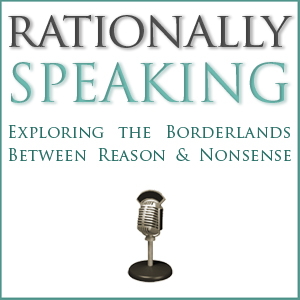Rationally Speaking #158 - Dr. George Ainslie on "Negotiating with your future selves"
Rationally Speaking Podcast
New York City Skeptics
4.6 • 787 Ratings
🗓️ 1 May 2016
⏱️ 47 minutes
🧾️ Download transcript
Summary
Transcript
Click on a timestamp to play from that location
| 0:00.0 | Rationally Speaking is a presentation of New York City skeptics dedicated to promoting critical thinking, skeptical inquiry, and science education. |
| 0:22.6 | For more information, please visit us at n.ycceptics.org. |
| 0:30.8 | Welcome to Rationally Speaking, the podcast where we explore the borderlands between reason and nonsense. |
| 0:41.3 | I'm your host, Julia Galeff, and with me is today's guest, Dr. George Ainsley. |
| 0:46.3 | He is a research psychiatrist at the Veteran Affairs Medical Center and also a professor of economics at the University of Cape Town, South Africa. |
| 0:54.0 | He's published several books, and the focus of his research and of those books has been |
| 0:59.2 | human motivation and willpower, and specifically this struggle that all of us face from time to time |
| 1:07.6 | or on a regular basis, struggle between how we wish we behaved on the one hand |
| 1:14.0 | and how we actually behave on the other. |
| 1:17.0 | So that's going to be the jumping off point for today's episode. |
| 1:20.4 | George, welcome to the show. |
| 1:22.1 | I'm glad to be here with you. |
| 1:23.9 | So just to orient our listeners, |
| 1:27.3 | I presume that everyone listening to this show can identify with this phenomenon in which, for example, it's Sunday and you're thinking about what you're going to do tomorrow and you decide, okay, tomorrow after work, I'm going to go straight to the gym. |
| 1:43.3 | And yeah, maybe it'll be a little unpleasant, but it's totally worth it because then I'll be getting in shape and I'll be healthy and getting fit and so on. |
| 1:51.9 | And then Monday rolls around. It's the end of the day. |
| 1:55.8 | And suddenly it doesn't feel so worth it anymore to go to the gym. |
| 1:59.5 | Suddenly it feels much more worth it to go home |
| 2:01.7 | and kick back with some Netflix. So what's happened here is there's this change in your |
| 2:08.6 | preferences where your preferences on Monday about gym versus Netflix are different from what your preferences |
| 2:16.2 | had been on Sunday about that Monday choice. |
| 2:19.5 | And also, much of the time, they're different from your preferences on Tuesday about what you wish you had chosen on Monday. |
... |
Please login to see the full transcript.
Disclaimer: The podcast and artwork embedded on this page are from New York City Skeptics, and are the property of its owner and not affiliated with or endorsed by Tapesearch.
Generated transcripts are the property of New York City Skeptics and are distributed freely under the Fair Use doctrine. Transcripts generated by Tapesearch are not guaranteed to be accurate.
Copyright © Tapesearch 2025.

